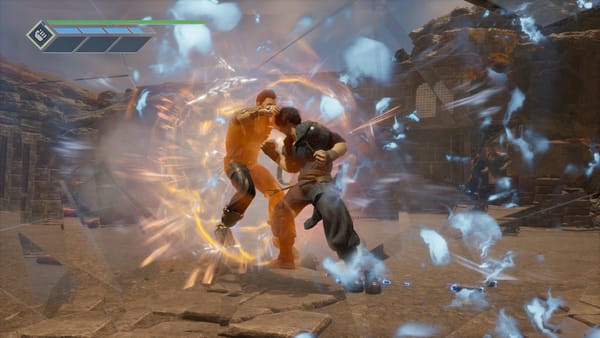#25: Denial of service
It seems faintly ludicrous that the runaway market leader should be this inhospitable to so many developers.
The impenetrable veil of secrecy around the game industry (wait, can a veil be impenetrable? If it is made of, say, inch-thick steel, is it still a veil? At times I really miss sub-editors) was momentarily pierced yesterday — oh god, can you even pierce a veil, it is naturally porous — with a Twitter thread from Iain Garner, co-founder of indie publisher Neon Doctrine. Garner, evidently, has finally had enough with what he called Platform X, “the operator of a very successful console that doesn’t have Game Pass.” He details a litany of failings in how said platform treats indies. He has since been backed up by several of his industry peers. It all makes for miserable reading.
To the weirdly small extent that the gaming press has picked this up, it has chosen to focus on Sony (whoops, named ‘em!) charging a minimum of $25,000 for a featured slot on the PlayStation (again!) Store. This is rather missing the point, I think; marketing does tend to cost money. The real story is in the dismal lack of support Sony gives to small developers and publishers — and worse, the almost total lack of control they are allowed over how their game is promoted and sold.
You cannot submit a trailer or PlayStation Blog post without first being assigned an account manager, which can take months, if it happens at all. There is no way to manually discount your game, as you can on other platforms: discounts are by invitation only, and those invites are limited. A wishlist system exists, but seemingly has no effect on anything. A follow-up thread from Matthew White, CEO of WhiteThorn Games, is similarly damning. PlayStation accounts for less than three per cent of WhiteThorn’s total sales; he speaks of waiting months for email responses, and of “internal chaos, with messages coming from random teams at random times.” All you can really do is make a game, stick it up on the store, and cross your fingers.
This is all, needless to say, terrible. Today’s indie developers and publishers succeed not just by making quality games. They must also obsess over data, moving needles this way and that and analysing the impact, making use of every tool available to them to maximise a game’s visibility on storefronts where competition has never been fiercer.
Sony’s systems are seemingly set up for an older, simpler and much smaller time — when store catalogues measured in the dozens rather than the thousands, and keeping developers happy was more about relationship management than empowering them with data. Over 3,000 games have been released for PlayStation 4 since launch. It would take an army of account managers to look after them all, and evidently Sony’s forces are small. As Valve has shown, you can run a successful store with a skeleton team well enough if you provide your developer clients with the tools and information to allow them to do their work without you. It seems faintly ludicrous to me that the runaway market leader should be this inhospitable to so many developers. Something, somewhere, has to change.
My concern this morning was for Garner, White and the others who’ve broken cover to talk publicly about their experience on PlayStation. They have surely breached the terms of the NDAs they signed when they sealed their developer agreements, and may face repercussions. But I hope within Sony there is a recognition that these developers have done them a favour, in a way. Talking about this stuff helps.
I was struck the other day by a rumour that Grand Theft Auto 6 will not be releasing until 2024 at the earliest. This, supposedly, is in part because Rockstar was stung by the negative reporting about its working conditions when Red Dead Redemption 2 was released, and is trying to make things better for its staff. Uncomfortable as it can be to have our dirty laundry aired in public, it at least prompts us to put a wash on.
In this business we learn as much from our failures as our successes. Any indie developer could tell you that — providing they’ve got the data to back it up, anyway.
MORE!
- All this chat about indies, data and the discovery problem means I finally have an opportunity to shout out Simon Carless’ wonderfully insightful GameDiscoverCo newsletter. Go give him a sub (unless you haven’t subbed to me yet, in which case do that first).
- The latest development in Media Molecule’s Dreams — something I greatly admire despite not really being clever or creative enough to understand — is called Megapenguin Rehatched. Molecule has made the first three levels; the rest of the game will be co-developed with the Dreams community. I am, at least, smart enough to understand that this is a work of genius.
- Another Sony acquisition: they’ve bought out Nixxes, the Dutch development studio behind the PC ports of Marvel’s Avengers and the Tomb Raider reboot trilogy, among others. A fairly sensible fit given Sony’s recent foray into PC gaming, but Square Enix must be a bit miffed.
- Things are going well for Final Fantasy XV developer Hajime Tabata: his new venture, JP Games, has two “large-scale” projects in the works for major companies.
There you go. I wasn’t planning on doing this today, but this PlayStation business felt too important not to write about. This means I get a day off tomorrow! Unless something else happens, I suppose. Will everybody else please take the day off — tell your bosses I said it was okay. Have an excellent weekend.





